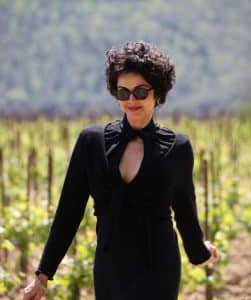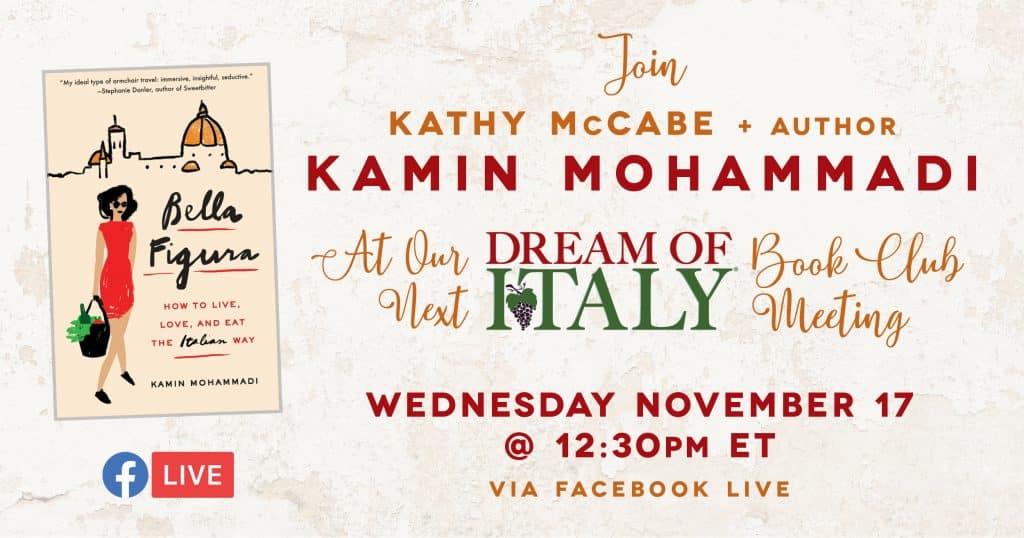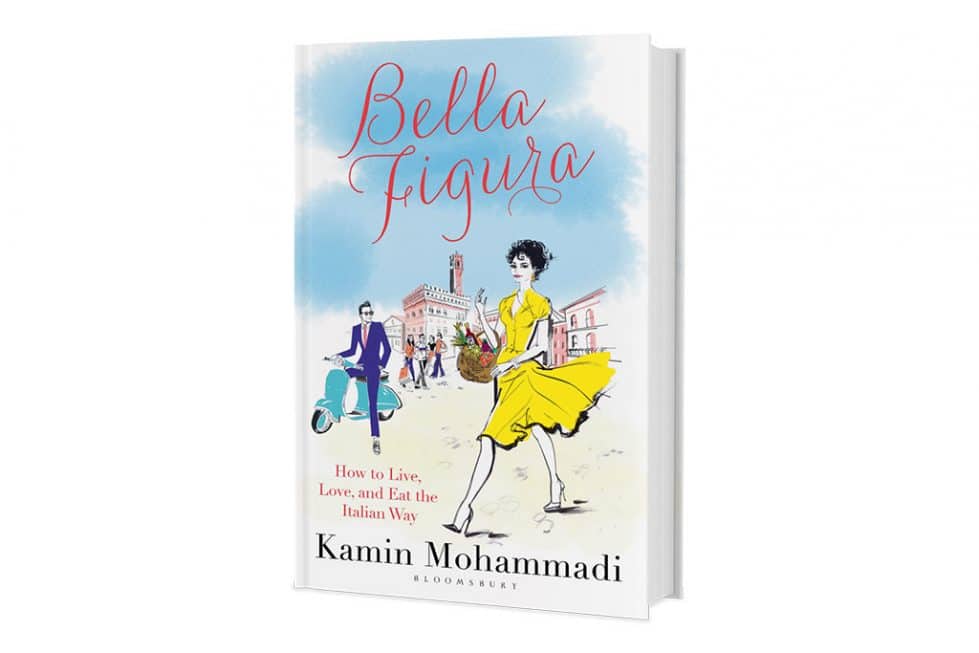This article originally appeared in the April 2018 issue of Dream of Italy. Find Kamin’s tips for Florence here. Join Kathy McCabe and Kamin on Facebook Live on November 17th for a Dream of Italy Book Club Meeting discussing Bella Figura: How to Live, Love and Eat the Italian Way. RSVP here!
Kamin Mohammadi has lived what sounds like a fairy tale: A decade ago she left her big-city, big-stress career in Manhattan, moved to Florence, met her Mr. Right, and now divides her time between his olive farm in Tuscany and London.
It sounds dreamy—until you know what went into Mohammadi’s journey. She arrived in Florence overweight, stressed, unemployed and disillusioned. It took a year in Italy before she got her happily ever after, and she attributes much of her newfound health and happiness to the Italian way of life.
Her new book, Bella Figura: How to Live, Love and Eat the Italian Way, is Kamin Mohammadi’s love letter to Italy, Florence and the man who is now her husband, Bernardo Conti.
Each chapter is devoted to a month, its best Italian produce, and a particular Italian word or phrase, from festina lente (hurry up slowly) to sprezzatura (finesse). Mohammadi laughs when asked if everything really happened in one year.
“That’s the best and craziest part!” she says. “And, I knew, at the end of that year, that I had to write about it. It just took me some time to see the significance of each step along the way.”
Dream of Italy Executive Editor Bethanne Patrick spoke with Mohammadi by phone from her home in Colognole in Tuscany.

Kamin Mohammadi: Yes, I miss my American American Express card! I’m sorry if that’s vulgar to say, but it’s true. I could have lovely lunches out with that card. I’ve been really really lucky; I’m back with that company doing a similar job, but on a magazine that comes out just twice a year.
I’m no longer in that space where it’s my be-all and end-all. And I get to go back for six weeks at a time, twice a year, and that’s probably just the right amount of time. I get to do the things I really enjoy, without the long-term stress.
DOI: Describe the difference between your two worlds.
KM: There’s a massive contrast between New York City, where I lived before I moved to Italy, and London, and Colognole. I just came back from nearly three months in London, a really intense period, and by around sort of week five I was done. It’s indescribable to come back here and not be on the Tube and not have buildings and noise and rush and pressure and stress—and all the amazing things of London too. I’ve been spoilt. I feel like I can’t really deeply de-stress in London now. I need the big sky.
DOI: Is it the surroundings, mainly? Or is there something else?
KM: Right. It’s pace of life as well. As soon as I get back here everything tastes so good. Whatever my level of stress has been I decompress, back to realizing that the point of a particular day can just be supper! It’s about the pleasure, the very simple life in Italy. In London there are many extremely pleasurable things—the one sunny day a year!—but the pleasures are quite sophisticated.
Just the quality of that blue of the sky in Florence, the palazzo, the Bardini Gardens, things so simple but so potent. . . It’s almost as if my values recalibrate. I just kind of naturally slow down and take a lot of pleasure from just going to the market and saying I’m just going to try this kind of vegetable.
DOI: A great deal of Bella Figura seems to focus on slowing down.
KM: I’m so happy you’ve picked up on this point, because while people can read the book as they want, this is one of the things I wanted to say. We’re kind of killing ourselves, there’s a level of unconsciousness about this. I can’t imagine how overstimulated I was for how long. I had a sort of level of tiredness that couldn’t be cured by even two weeks away. I think back to that whole year, the first nine months, it must have been this nice slow rebalancing of things. While my daily life slowed down, my body grew healthier.

DOI: What struck you most, in that year, about Italians in general?
KM: Their sort of gentle lack of ambition, I don’t mean as an insult. It’s not that people are not ambitious, it’s just that the ambitions are slightly different. I sometimes stop when I’m rushing around London and remember that it doesn’t have to be this way. I think that pace is really brutal, and where’s the space for you if you’re not able to be brutal?
DOI: Did you go to Italy looking for a relationship?
KM: No! I’ve always been the kind of woman who always thinks I shouldn’t do things because of men. I look back and almost see my move as me floating about, a glob of universal potential. I don’t know if I’d sat down and planned if I’d ever have had the guts to do it. It was stepping off a cliff, but it was sort of okay because I didn’t think about it that much.
I’d been fired from my job and provided with an apartment in Florence, first for two weeks, then for another month, and so on as my friend Christobel who owned the place saw that I was making a new life for myself in Italy. I didn’t have the guts to resign and move. I was just lucky!
DOI: Besides the apartment, how did you manage to live?
KM: I had a little bit of money because of the redundancy. The fact that nothing is coming in is quite scary. How long actually could I stay? I hadn’t thought it through very thoroughly. That said, all of the things we think are so important that hold us where we are, they disappeared for me. I wasn’t married and didn’t have kids so I had that freedom for sure. I thought it was really going to be hard to leave everything, but it wasn’t. I was really surprised by how freeing it all was for me.
DOI: Was that due to Florence, or something else?
KM: I think Florence really helped because people are really nice, but it was mainly the weird freedom of suddenly realizing that it’s not that hard to start again somewhere else. My decision to stay was really based on creativity, about the choices for my writing, and I was able to do that because I had a place to stay—thanks, Christobel!
I didn’t have a lot of stress about what was going to happen. At the beginning, I never said “This is where I’m going to stay.” But by month eight or so, I said “Why would I go back to London when this exists?” I am very practical, and I could not find an answer to that question!
DOI: How are love and romance different?
KM: Romance is lovely, but it’s not very real. For stuff to be romantic in that overblown “Aaaahhh! Romance!” way, you need to not know each other very well. I didn’t think that at the time when I was having that kind of romantic affair, with a man named Dino, but I know that in retrospect. For proper love, which is not Hollywood at all, it’s much more real, it’s about the stuff of life, it stops being about did he call me did he like me and becomes about real-life things instead of a slightly self-centered view of yourself. Love can be really messy.
You can get it wrong a lot, and that’s okay. Actually the most romantic thing in the world is to have this man with a messy background, Bernie, who wasn’t afraid to put his heart on the line again. And with someone, me, whose situation is not fantastically stable.
When I met Bernie I was in month ten and that was really important too. My time in Florence was beginning to mature. It was a great time for him to turn up. I was ready for my life in Italy to have more layers.
DOI: Why make the “bella figura,” anyway? Let’s talk about how this concept evolved.
KM: Now that the book is available I’ve got a few Italian friends who have really questioned it, who have said, what are you talking about? Some people who are Italian hate this concept. You could see it in a negative way, as in “keeping up appearances.” I don’t think that goes deep enough.
I’m not doing a dictionary definition of it in this book. Ultimately the book’s written for people in American/Canada/U.K., not for Italians! But I remember the whole concept of it, being really struck by it when I was dating Dino, with his kind of openness about who he was—glamorous, fashion-focused, living for the moment.
I was looking for consistency, but my friend Kicca said don’t look for consistency! In Italy you can have a Fascist politician who goes out with a black model, but he doesn’t see the contradiction because she’s beautiful. That’s the negative side of bella figura, things being all for show.
DOI: But you, of course, focus on a different, deeper side.
KM: Yes, the deeper aspects of are that bella figura is about the outside, but that’s just the bit you’re showing to the world. For me and for the Italians I met who guided me, the quest for beauty can be very cosmic. What matters when you manifest beauty, whether in just swiping on lipstick or decking yourself out in a designer dress, is that you yourself feel so good you want to show it.
There’s no outer bella figura without inner bella figura. Remember, Italians are very human oriented, very community minded. It almost elevates the seeking of beauty in all its forms into a spiritual practice.
DOI: Does this have particular meaning for women?
KM: I’m from a culture, in Iran, where woman are imposed on quite a lot. I’m not keen on that thing where you have to put on your lipstick before you leave the house but what I was saying is if you can be bothered to do whatever it is that makes YOU feel amazing, you’ll feel amazing!
If you do what you have to do with a smile on your face instead of a scowl, you only have to be a little more deliberate. And by the way, does wearing that fuchsia lipstick make you smile? Why don’t you? What are you saving it up for? If you have beautiful shoes, enjoy them! Find what makes you feel special. Go to that little seed inside you that exists and nurture it and grow it.
If Bella Figura gives you a way into that? Fantastico. A sort of mindfulness, I think. I don’t want to use words that are used to beat us up, these days. Consideration. What is that if not mindfulness? That’s how I would like to approach my version of bella figura, because the strict Italian version can be kind of restrictive. Italian society can be very restrictive for women. It’s really great to know the rules so you can decide how you’re going to fit into them. You can acknowledge your mistakes, and maybe make some of your own rules, too.
DOI: Have you done that?
KM: Perhaps therefore I’ll never be as elegant as a true Italian. In the same way that the food aspect is about going back to natural/whole foods, once your body’s had a chance to clear out some of the unbalance, then actually your body too will go back into balance, you reconnect with the rest of your environment.
You can start to have a little bit of confidence back. It makes you a bit less liable to the adman’s ways and all these contradictory messages we all get. What’s healthy is what’s been healthy forever. Do it the bella figura way. Sit down with your chocolate cake or whatever it is, enjoy it, give it your attention. Then it will satisfy you.
DOI: What are some of the things you wish you’d known about Italy before you arrived?
KM: For one thing: No Italian ever drinks a cappuccino after 10 a.m.! Coffee is a stimulant, it’s your fuel, and you don’t need milky drinks interfering with your appetite or digestion during the day and evening. I was so accustomed to the American/English habit of ordering enormous lattes and carrying them around through commutes and meetings. It’s much more civilized to have a lovely milky coffee as you wake up, then savor an espresso, perhaps with a bit of sugar if you like it, after lunch or during an afternoon slump.
Another thing I wish I’d known: Italians never drink without eating. You won’t find any Italian drinking alone, and where there is a group of Italians drinking, there is a group of Italians eating. The aperitivo tradition is very strong, just as eating tapas is in Spain—but eating doesn’t have to mean heavy, filling fare. A dish of delicious pinzimonio (excellent olive oil dressed with lemon juice and pepper, or balsamic vinegar) and some good raw vegetables, maybe some grissini, and you’ve got a very happy hour.
Speaking of groups, I quickly discovered that while you can cook for yourself quite easily with the delicious produce available in Italian markets, my Italian friends made meal preparation into a group activity, too. One person might be cooking onions while another sliced fennel and then someone else would hand me a can of tomatoes to open. Cooking isn’t precious or mysterious in Italy. Almost everyone knows how to make a quick meal that will knock your socks off, and everyone knows how to pitch in and help get food on the table.
DOI: Did you find yourself eating differently in Italy?
KM: Absolutely! Yes, there’s pasta everywhere, and yes, I ate pasta and I eat pasta and I’ll never give it up, but it’s not about the huge portions that I once saw and consumed before I lived here. Pasta might be one course, a small course, between an enormous serving of whatever’s most fresh from the market and a perfectly cooked piece of fish or beef. Also, and I have a chapter centered on this recipe: Sometimes all I would want and need for lunch would be a tangle of greens with citrus and aromatics.
Less can be very satisfying when all of the flavors are right, when all of the flavors mingle and delight you. That’s why I wanted to include the recipes in this book, by the way, not because I am a food writer or professional cook, but because I want to show people how easy it is to wake up your senses with food as well as with architecture, fashion, art, and conviviality. Considering what you eat and paying attention as you eat it can change many things—and not just your weight. Every season in Italy has its bella figura foods and meals.
Please note that Kamin produces the most lovely Magic Olive Oil and Magic Balm at her home in Tuscany. Kamin is also an incredible writing instructor and can help you craft your own memoir with her online course!
–Bethanne Patrick
Photo by Bernardo Conti

